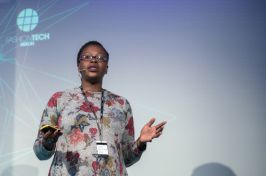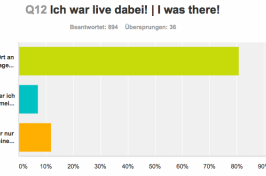Artificial intelligence has become an integral part of our lives. CCTV, wearables and learning machines are recognising our faces and voices, tracking our movements and predicting our actions. In her talk “Know your terrorist credit score!” on Day 1 Main Stage speaker Kate Crawford wants to take our fears away by introducing a legal framework.
What seems like a big nightmare for most people is Kate Crawford’s passion. She is the Principal Researcher at Microsoft Research New York City, visiting professor at MIT. At re:publica 2016, she promotes a better legal framework instead of dystopian views on despotic robots.
“There are concerns that artificial intelligence becomes so smart that it overthrows the human race”, Crawford says. “But in many ways, the concern is not new. It has been around since the 1950s, and now most personified by Nick Boston and his book ’Super Intelligence’.” However, she believes that the data and the technology are already there, whereas the discourse is still stuck in an all-or-nothing attitude. This could be a part of the problem: “Singularity hides the problem. By looking at artificial intelligence in a singular way only, we are failing to look at the technology that we are already relying on in our everyday life.”
What Crawford suggests instead: A legal framework that makes artificial intelligence more transparent, democratic and fair, and systems that help humans to be less judgemental than they are now.
Crawford’s strategy is to use big data to work on current forms of inequality. “For now, technology is used on the least privileged”, she says pointing towards a recent IBM experiment. The company had inserted a massive amount of data to distinguish between refugees and jihadists. This data was used to cross-correlate it with new arrivals. “But how do they even know that somebody generated this data?“, she asks. “If we know where machines are discriminating now, we are much better placed to design fair artificial intelligence. Systems can be manipulated and social and ethical issues can be tackled.”
Is it the time to do this? “We have a critical moment right now”, she says.
Photo credit: re:publica/Gregor Fischer (CC BY 2.0)





